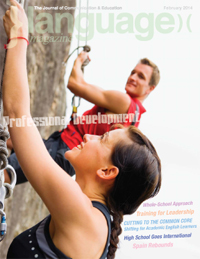FCC Chairman Tom Wheeler announced that the Federal Communications Commission (FCC) will work to improve the federal E-Rate program to facilitate access to internet and digital resources for schools and libraries.
His remarks follow an announcement by President Obama that a host of high-tech companies have pledged $750 million in devices, content, services, and new teacher and principal professional development to increase digital learning opportunities.
Chairman Wheeler noted actions the FCC will undertake over the coming year to modernize the federal program, including focusing on high-speed connectivity to every school and library, updating how the FCC manages the program by streamlining the overall application process to make it easier and faster for schools and libraries to apply for and receive funds, and ensuring sufficient resources are made available to meet any modernization goals beginning with a $2 billion investment.
Chairman Wheeler remarked that we “have a problem that must be fixed” when there is digital inequity for our students and communities with a majority of our schools and libraries connected at internet speeds on par with the average U.S. home.
As the way we consume information and literature becomes increasingly mediated by technology, and less about printed books, public libraries have been taking strides to re-imagine their roles in communities. Libraries today are using cloud-based storage so that users can access digital holdings from anywhere. Libraries have traditionally been sites for storing unique collections and local histories, which today libraries are digitizing and making available online. Furthermore, libraries play a key role in bridging the digital divide. Libraries are the only place where many students to access free access to computers and the internet. As libraries revolutionize their services, insufficient broadband and internet speed pose a challenge across the country.




 An article on the Hong Kong Education Bureau’s website claiming “Cantonese is not an official language” has been removed after criticism. The article, posted on the Language Learning Support site last month, aimed to promote the importance of bilingualism and trilingualism as the city “develops alongside the rapidly growing China” and “the daily usage of Mandarin [in Hong Kong] becomes common.”
An article on the Hong Kong Education Bureau’s website claiming “Cantonese is not an official language” has been removed after criticism. The article, posted on the Language Learning Support site last month, aimed to promote the importance of bilingualism and trilingualism as the city “develops alongside the rapidly growing China” and “the daily usage of Mandarin [in Hong Kong] becomes common.” With its $721 million acquisition of Brazil’s Grupo Multi, Pearson has become the market leader in English language education amongst adults in Brazil. Grupo Multi provides English-language training through a variety of language school chains, most notably Wizard, Microlins, Skill and Yazigi. Grupo Multi serves over 800,000 students across 2,600 franchized schools for children, adolescents, and adults.
With its $721 million acquisition of Brazil’s Grupo Multi, Pearson has become the market leader in English language education amongst adults in Brazil. Grupo Multi provides English-language training through a variety of language school chains, most notably Wizard, Microlins, Skill and Yazigi. Grupo Multi serves over 800,000 students across 2,600 franchized schools for children, adolescents, and adults.
